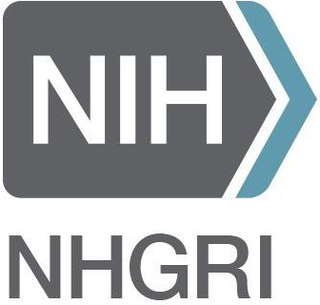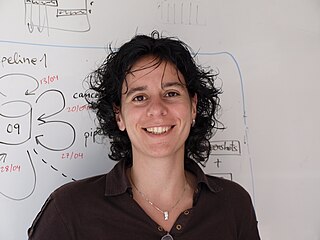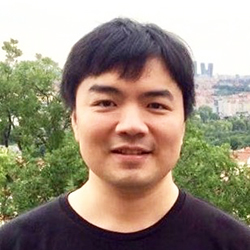
The National Human Genome Research Institute (NHGRI) is an institute of the National Institutes of Health, located in Bethesda, Maryland.
Tom Maniatis, is an American professor of molecular and cellular biology. He is a professor at Columbia University, and serves as the Scientific Director and CEO of the New York Genome Center.

Steven Lloyd Salzberg is an American computational biologist and computer scientist who is a Bloomberg Distinguished Professor of Biomedical Engineering, Computer Science, and Biostatistics at Johns Hopkins University, where he is also Director of the Center for Computational Biology.

Busch Campus is one of the five sub-campuses at Rutgers University's New Brunswick/Piscataway area campus, and is located entirely within Piscataway, New Jersey, US. Academic facilities and departments centered on this campus are primarily those related to the natural sciences: physics, pharmacy, engineering, psychology, mathematics and statistics, chemistry, geology, and biology. The Rutgers Medical School was also built on this campus in 1970, but a year later was separated by the state, renamed the Robert Wood Johnson Medical School, and merge with the New Jersey Medical School and other health profession schools in Newark and New Brunswick to create the College of Medicine and Dentistry of New Jersey. Rutgers and the medical school continued to share the land and facilities on the campus in a slightly irregular arrangement. On July 1, 2013, Robert Wood Johnson Medical School was officially merged back into Rutgers University, along with most of the other schools of UMDNJ, with the exception of the UMDNJ-School of Osteopathic Medicine.

The College of Biological Sciences (CBS) is one of seven freshman-admitting colleges at the University of Minnesota. Established in 1869 as the College of Science, the College of Biological Science is now located across both the Minneapolis and the St. Paul campuses. As of June 29, 2023, the dean of the College of Biological Sciences is Dr. Saara J DeWalt.

King Abdullah University of Science and Technology is a public research university located in Thuwal, Saudi Arabia. Founded in 2009, the university provides research and graduate training programs in English as the official language of instruction. It is named after King Abdullah bin Abdulalziz, the ruler of Saudi Arabia from 2005 until 2015.

The California Institute for Quantitative Biosciences (QB3) is a nonprofit research and technology commercialization institute affiliated with three University of California campuses in the San Francisco Bay Area: Berkeley, San Francisco, and Santa Cruz. QB3's domain is the quantitative biosciences: areas of biology in which advances are chiefly made by scientists applying techniques from physics, chemistry, engineering, and computer science.
Mark Borodovsky is a Regents' Professor at the Join Wallace H. Coulter Department of Biomedical Engineering of Georgia Institute of Technology and Emory University and Director of the Center for Bioinformatics and Computational Genomics at Georgia Tech. He has also been a Chair of the Department of Bioinformatics at the Moscow Institute of Physics and Technology in Moscow, Russia from 2012 to 2022.

Douglas James Hilton is an Australian molecular biologist. He is the CEO of CSIRO and immediate past Director of the Walter and Eliza Hall Institute of Medical Research in Melbourne, Australia. His research has focused on cytokines, signal transduction pathways and the regulation of blood cell formation (hematopoiesis). Hilton was the President of the Association of the Australian Medical Research Institutes (AAMRI) from 2014-16.

Aviv Regev is a computational biologist and systems biologist and Executive Vice President and Head of Genentech Research and Early Development in Genentech/Roche. She is a core member at the Broad Institute of MIT and Harvard and professor at the Department of Biology of the Massachusetts Institute of Technology. Regev is a pioneer of single cell genomics and of computational and systems biology of gene regulatory circuits. She founded and leads the Human Cell Atlas project, together with Sarah Teichmann.

Amrita Vishwa Vidyapeetham, commonly known as Amrita University, is a private deemed university in India. It is a multi-campus, multi-disciplinary university with its headquarters located in Ettimadai, Coimbatore. It constitutes of 8 campuses with 18 constituent schools across 5 Indian states, namely Amaravati, Amritapuri, Bangalore, Chennai, Coimbatore, Kochi, Mysore, and Faridabad.

Atul J. Butte is a biomedical informatics researcher and biotechnology entrepreneur. He is currently the Priscilla Chan and Mark Zuckerberg Distinguished Professor at the University of California, San Francisco. Since April 2015, Butte has serves as inaugural director of UCSF's Bakar Computational Health Sciences Institute.

The Princeton Neuroscience Institute (PNI) is a center for neuroscience research at Princeton University. Founded in the spring of 2004, the PNI serves as a "stimulus for teaching and research in neuroscience and related fields" and "places particular emphasis on the close connection between theory, modeling, and experimentation using the most advanced technologies." It often partners with Princeton University's departments of Psychology and Molecular Biology.

The Computational Biology Department (CBD) is a division within the School of Computer Science at Carnegie Mellon University in Pittsburgh, Pennsylvania, United States. It is located in the Gates-Hillman Center. Established in 2007 by Robert F. Murphy as the Lane Center for Computational Biology with funding from Raymond J. Lane and Stephanie Lane, CBD became a department within the School of Computer Science in 2016.

Núria López Bigas is a Spanish biologist and research professor with expertise in medical genetics, computational biology, and bioinformatics. She is an ICREA professor at Pompeu Fabra University and she also leads the Biomedical Genomics Research Group at the Institute for Research in Biomedicine in Barcelona, Spain. Her research is focused on developing computational approaches to investigate cancer genomes.

Mark S. Boguski was an American pathologist specializing in computational analysis and structural biology, He was elected in 2001 to the U.S. National Academy of Medicine, and was a Fellow of the American College of Medical Informatics.
The Johns Hopkins University Department of Biomedical Engineering has both undergraduate and graduate biomedical engineering programs located at the Johns Hopkins University in Baltimore, Maryland.

Manolis Kellis is a professor of Computer Science at the Massachusetts Institute of Technology (MIT) in the area of Computational Biology and a member of the Broad Institute of MIT and Harvard. He is the head of the Computational Biology Group at MIT and is a Principal Investigator in the Computer Science and Artificial Intelligence Lab (CSAIL) at MIT.

Jian Ma is an American computer scientist and computational biologist. He is the Ray and Stephanie Lane Professor of Computational Biology in the School of Computer Science at Carnegie Mellon University. He is a faculty member in the Computational Biology Department. His lab develops machine learning algorithms to study the structure and function of the human genome and cellular organization and their implications for evolution, health and disease. During his Ph.D. and postdoc training, he developed algorithms to reconstruct the ancestral mammalian genome. His research group has recently pioneered a series of new machine learning methods for 3D epigenomics, comparative genomics, spatial genomics, and single-cell analysis. He received an NSF CAREER award in 2011. In 2020, he was awarded a Guggenheim Fellowship in Computer Science. He is an elected Fellow of the American Association for the Advancement of Science. He leads an NIH 4D Nucleome Center to develop machine learning algorithms to better understand the cell nucleus. He is the Program Chair for RECOMB 2024.
Li Ding is the David English Smith Distinguished Professor of Medicine at Washington University. She is known for the development of multiple computational tools now commonly used in cancer biology research, including VarScan, HotSpot3D, and BreakDancer.















